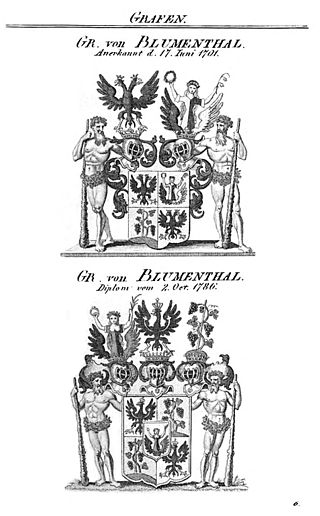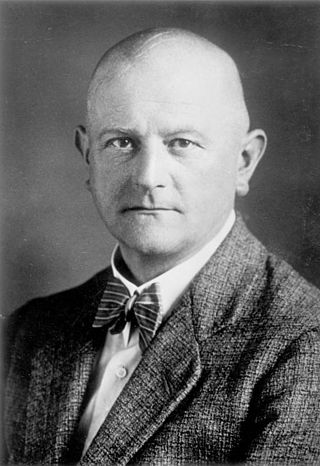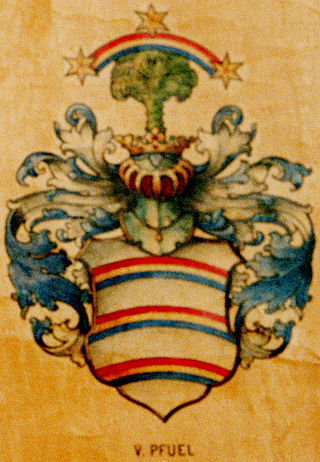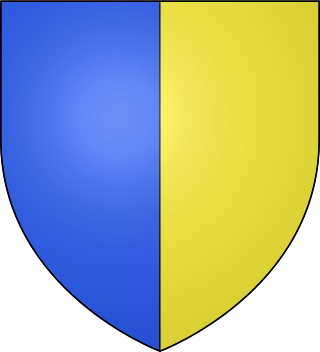
The Vincke family is an old and influential German noble family from Westphalia, with its roots in Lower Saxony, whose members distinguished themselves as politicians, mostly in the Kingdom of Prussia.

The Vincke family is an old and influential German noble family from Westphalia, with its roots in Lower Saxony, whose members distinguished themselves as politicians, mostly in the Kingdom of Prussia.
First recorded in 1223 in Osnabrück, their name derives from the zoonym finch (Middle High German vinke). They acquired estates in the present communities of Melle (Gut Ostenwalde) and Rödinghausen (Haus Kilver) in the 14th century, and in the 18th to 19th centuries further possessions in Rödinghausen and other parts of Westphalia, as well in Silesia (Kilver line).
In the 19th century, Prussia granted the habitual right to the title Freiherr (baron); the predicate von was used only by parts of the family (Freiherren Vincke vs. Freiherren von Vincke).
Notable member of the Olbendorf line (Kilver line) of the family was the Prussian politician Carl von Vincke. Ludwig von Vincke, of the Ostenwalde line (1774–1844), served as president of the Prussian Province of Westphalia. His sons were the politician Georg von Vincke, known for fighting a pistol duel with Otto von Bismarck in 1852, and Gisbert von Vincke (1813–1892), Prussian official, poet and Shakespeare-researcher.
Gut Ostenwalde with the nearby Diedrichsburg is yet a property of the Vincke family, whereas Haus Kilver had to be sold in the 1820s for economic reasons. After World War II Gut Ostenwalde was confiscated by the British Army as residence for the commanders of the British occupation zone in Germany, Field Marshall Bernard Montgomery and his successors Marshall Sholto Douglas and General Brian Robertson.

The Junkers were members of the landed nobility in Prussia. They owned great estates that were maintained and worked by peasants with few rights. These estates often lay in the countryside outside of major cities or towns. They were an important factor in Prussian and, after 1871, German military, political and diplomatic leadership. The most famous Junker was Chancellor Otto von Bismarck. Bismarck held power in Germany from 1871 to 1890 as Chancellor of the German Empire. He was removed from power by Kaiser Wilhelm II.

George V was the last king of Hanover, reigning from 18 November 1851 to 20 September 1866. The only child of King Ernest Augustus and Queen Frederica, he succeeded his father in 1851. George's reign was ended by the Austro-Prussian War, after which Prussia annexed Hanover.

Georg Friedrich Ferdinand Prinz von Preussen is a German businessman who is the current head of the Prussian branch of the House of Hohenzollern, the former ruling dynasty of the German Empire and of the Kingdom of Prussia. He is the great-great-grandson and historic heir of Wilhelm II, the last German Emperor and King of Prussia, who abdicated and went into exile upon Germany's defeat in World War I in 1918. Thus he is a fourth great-grandson of Queen Victoria of the United Kingdom and a distant cousin of many European monarchs.
The term von ( ) is used in German surnames either as a nobiliary particle indicating a noble patrilineality, or as a simple preposition used by commoners that means 'of' or 'from'.

The Blumenthal family is a Lutheran and Roman Catholic German noble family, originally from Brandenburg-Prussia. Other (unrelated) families of this name exist in Switzerland and formerly in Russia, and many unrelated families called Blumenthal, without "von", are to be found worldwide.
The German Progress Party was the first modern political party in Germany, founded by liberal members of the Prussian House of Representatives in 1861 in opposition to Minister President Otto von Bismarck.

Johan Heinrich Ludwig Müller was a German theologian, a Lutheran pastor, and leading member of the pro-Nazi "German Christians" faith movement. In 1933 he was appointed by the Nazi Party as Reichsbischof of the German Evangelical Church.

The Province of Westphalia was a province of the Kingdom of Prussia and the Free State of Prussia from 1815 to 1946. In turn, Prussia was the largest component state of the German Empire from 1871 to 1918, of the Weimar Republic and from 1918 to 1933, and of Nazi Germany from 1933 until 1945.

The House of Bismarck is a German noble family that rose to prominence in the 19th century, largely through the achievements of the statesman Otto von Bismarck. He was granted a hereditary comital title in 1865, the hereditary title of Prince of Bismarck in 1871, and the non-hereditary title of Duke of Lauenburg in 1890. Several of Otto von Bismarck's descendants, notably his elder son Herbert, Prince of Bismarck, have also been politicians.

The Manteuffel family is an old and influential German Pomeranian noble family, which later also resided in Brandenburg, Prussia, Silesia, Mecklenburg, Poland, the Baltics and in Russia.

Frederick William George Adolphus, Landgrave of Hesse was the only son of Wilhelm I, Landgrave of Hesse-Kassel-Rumpenheim and Princess Louise Charlotte of Denmark.

The Pfuel family is an ancient German noble family that arrived to Brandenburg in the year 926 and later widened their influence to Saxony, Saxony-Anhalt, Mecklenburg, Pomerania, Württemberg, Westphalia, Eastern Europe and Sweden.

Maximilian (Max) Franz August von Forckenbeck was a German lawyer and liberal politician who served as Mayor of Berlin from 1878 until his death. His is considered one of the most important mayors of the city because of his prudent governing style during Berlin's rise as the capital of a unified Germany.

The House of Plettenberg is the name of the Westphalian noble family of the Uradel. It dates back at least to 1187, when Heidolphus de Plettenbrath was mentioned in a document by Philip I. Plettenberg-Wittem branch that ruled immediate Lodships of Meitingen and Sulmingen lost its sovereignty and became mediatised to Württemberg in 1806. This line of the family went extinct in 1813.

Friedrich Ludwig von Ronne was a Prussian jurist, politician, diplomat and German Ambassador to the United States.

Georg von Vincke was a Prussian politician, officer, landowner and aristocrat. As a political figure he was associated with the Old Liberals.

The Hobe family is the name of an old German noble family from Mecklenburg, which also became influential in Denmark. Branches of the family are still in existence today.

Karl Gisbert Friedrich Freiherr von Vincke was a Prussian officer and politician.
Vincke or von Vincke is a surname. Notable people with the surname include:

Friedrich Ludwig Wilhelm Philip Freiherr von Vincke was a liberal Prussian statesman. Born as member of an old Westphalian noble family and educated at three universities in a broad variety of subjects, he entered the Prussian service as head of local and regional authorities. Influenced by ideas of British liberalism, he joined the Prussian Reform Movement during the times of Napoleonic Wars, and was an important member as co-worker of the Barons vom Stein and vom Stein zum Altenstein.